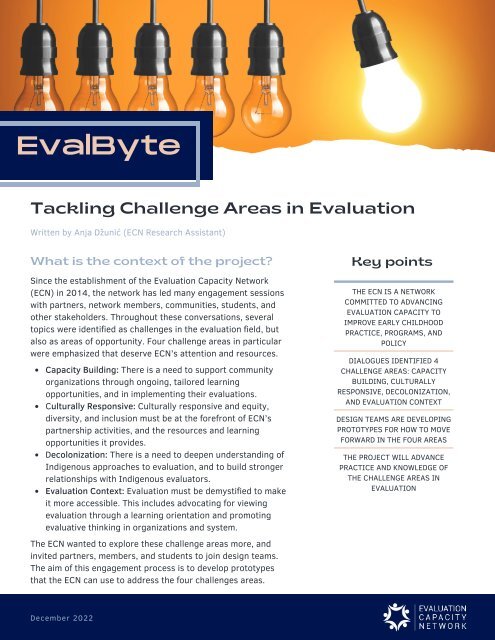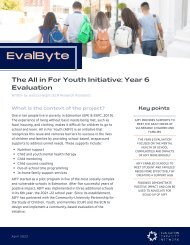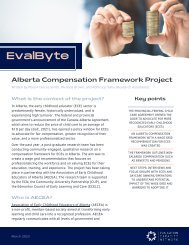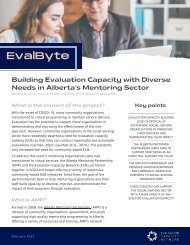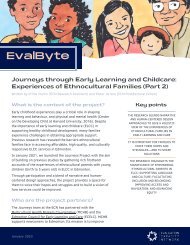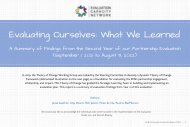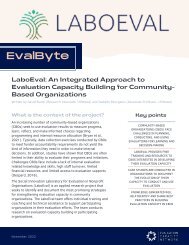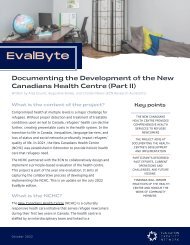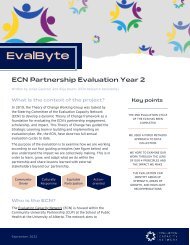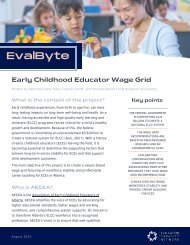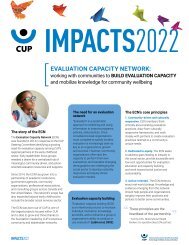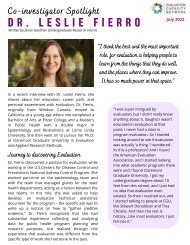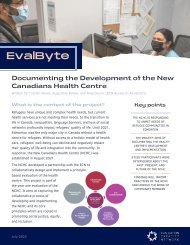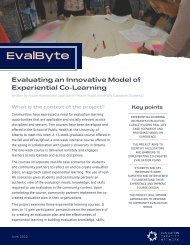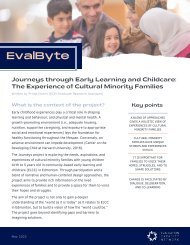EvalByte: Tackling Challenge Areas in Evaluation
You also want an ePaper? Increase the reach of your titles
YUMPU automatically turns print PDFs into web optimized ePapers that Google loves.
<strong>EvalByte</strong><br />
<strong>Tackl<strong>in</strong>g</strong> <strong>Challenge</strong> <strong>Areas</strong> <strong>in</strong> <strong>Evaluation</strong><br />
Written by Anja Džunić (ECN Research Assistant)<br />
What is the context of the project?<br />
S<strong>in</strong>ce the establishment of the <strong>Evaluation</strong> Capacity Network<br />
(ECN) <strong>in</strong> 2014, the network has led many engagement sessions<br />
with partners, network members, communities, students, and<br />
other stakeholders. Throughout these conversations, several<br />
topics were identified as challenges <strong>in</strong> the evaluation field, but<br />
also as areas of opportunity. Four challenge areas <strong>in</strong> particular<br />
were emphasized that deserve ECN’s attention and resources.<br />
Capacity Build<strong>in</strong>g: There is a need to support community<br />
organizations through ongo<strong>in</strong>g, tailored learn<strong>in</strong>g<br />
opportunities, and <strong>in</strong> implement<strong>in</strong>g their evaluations.<br />
Culturally Responsive: Culturally responsive and equity,<br />
diversity, and <strong>in</strong>clusion must be at the forefront of ECN’s<br />
partnership activities, and the resources and learn<strong>in</strong>g<br />
opportunities it provides.<br />
Decolonization: There is a need to deepen understand<strong>in</strong>g of<br />
Indigenous approaches to evaluation, and to build stronger<br />
relationships with Indigenous evaluators.<br />
<strong>Evaluation</strong> Context: <strong>Evaluation</strong> must be demystified to make<br />
it more accessible. This <strong>in</strong>cludes advocat<strong>in</strong>g for view<strong>in</strong>g<br />
evaluation through a learn<strong>in</strong>g orientation and promot<strong>in</strong>g<br />
evaluative th<strong>in</strong>k<strong>in</strong>g <strong>in</strong> organizations and system.<br />
The ECN wanted to explore these challenge areas more, and<br />
<strong>in</strong>vited partners, members, and students to jo<strong>in</strong> design teams.<br />
The aim of this engagement process is to develop prototypes<br />
that the ECN can use to address the four challenges areas.<br />
Key po<strong>in</strong>ts<br />
THE ECN IS A NETWORK<br />
COMMITTED TO ADVANCING<br />
EVALUATION CAPACITY TO<br />
IMPROVE EARLY CHILDHOOD<br />
PRACTICE, PROGRAMS, AND<br />
POLICY<br />
DIALOGUES IDENTIFIED 4<br />
CHALLENGE AREAS: CAPACITY<br />
BUILDING, CULTURALLY<br />
RESPONSIVE, DECOLONIZATION,<br />
AND EVALUATION CONTEXT<br />
DESIGN TEAMS ARE DEVELOPING<br />
PROTOTYPES FOR HOW TO MOVE<br />
FORWARD IN THE FOUR AREAS<br />
THE PROJECT WILL ADVANCE<br />
PRACTICE AND KNOWLEDGE OF<br />
THE CHALLENGE AREAS IN<br />
EVALUATION<br />
December 2022
Who is the ECN?<br />
The ECN, hosted with<strong>in</strong> the<br />
Community-University Partnership<br />
at the University of Alberta, is a<br />
network of <strong>in</strong>dividuals and<br />
organizations from across Canada<br />
and the United States who are<br />
committed to advanc<strong>in</strong>g evaluation<br />
capacity <strong>in</strong> the field of early<br />
childhood development. This is<br />
accomplished through communitydriven,<br />
culturally responsive, and<br />
action oriented capacity build<strong>in</strong>g<br />
opportunities, activities, and resources. Its goal is<br />
to collaboratively develop community-driven and<br />
culturally responsive approaches for produc<strong>in</strong>g<br />
and us<strong>in</strong>g evidence to improve early childhood<br />
practice, programs, and policy towards system<br />
effectiveness.<br />
What is the project work<strong>in</strong>g<br />
on?<br />
In November, the ECN hosted a virtual partnership<br />
meet<strong>in</strong>g to further discuss the four challenge<br />
areas. Thirty-seven partners, network members,<br />
and students jo<strong>in</strong>ed the conversation to engage <strong>in</strong><br />
visionary and creative dialogues. This set a<br />
foundation for the creation of four design teams.<br />
Teams of 3-5 participants were <strong>in</strong>vited to focus on<br />
one challenge area and advance the dialogue.<br />
Start<strong>in</strong>g this month, the teams are meet<strong>in</strong>g once or<br />
twice a month to develop a prototype for how the<br />
ECN should move forward <strong>in</strong> the specific areas.<br />
They are encouraged to <strong>in</strong>vite other <strong>in</strong>dividuals<br />
who can provide expertise <strong>in</strong> their challenge area.<br />
The ECN is support<strong>in</strong>g the design teams with<br />
guidance and resources they need to be<br />
Why is the project<br />
mean<strong>in</strong>gful?<br />
Resources<br />
These videos are brief summaries of the<br />
discussions of each challenge area held dur<strong>in</strong>g<br />
the partnership meet<strong>in</strong>g <strong>in</strong> November.<br />
Capacity Build<strong>in</strong>g<br />
Culturally Responsive<br />
Decolonization<br />
successful, such as student<br />
facilitators, technical and<br />
f<strong>in</strong>ancial support, and<br />
physical space.<br />
A showcase will be organized<br />
<strong>in</strong> February where each<br />
design team will present its<br />
prototype. The ECN will then<br />
take the four prototypes and<br />
explore how to best<br />
implement them over the<br />
com<strong>in</strong>g years of the<br />
partnership.<br />
This engagement process is an opportunity to<br />
grow the network and learn from each other. It<br />
will help the ECN move forward <strong>in</strong> the four<br />
challenge areas while shap<strong>in</strong>g its priorities over<br />
the next years. This will advance knowledge and<br />
practice <strong>in</strong> the four areas, and grow the<br />
evaluation field <strong>in</strong> accessible and mean<strong>in</strong>gful<br />
ways.<br />
<strong>Evaluation</strong> Context (Demystify)<br />
Acknowledgment<br />
The <strong>Evaluation</strong> Capacity Network is funded by the Social Science and Humanities Research Council of Canada (SSHRC). We thank all<br />
partners, members, and students who have jo<strong>in</strong>ed this engagement process.<br />
December 2022


